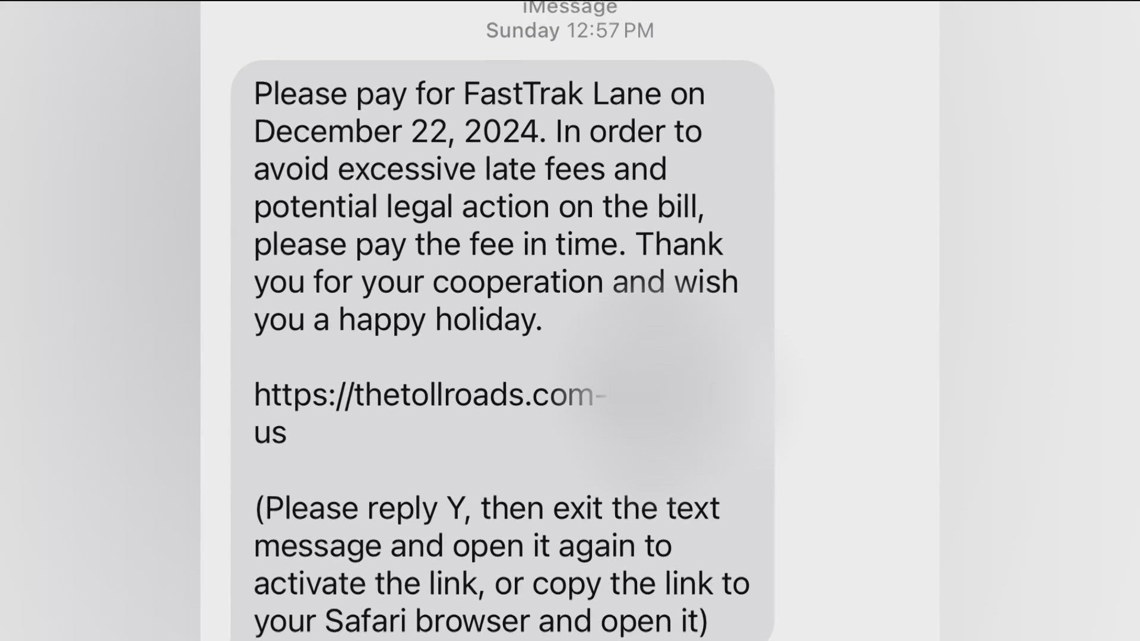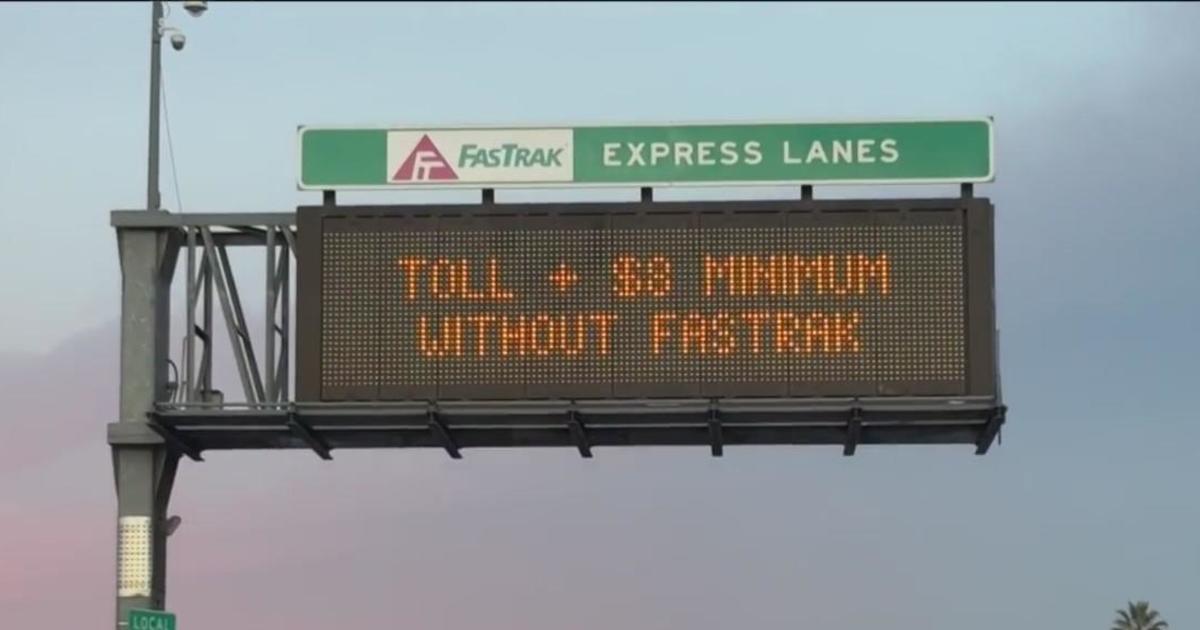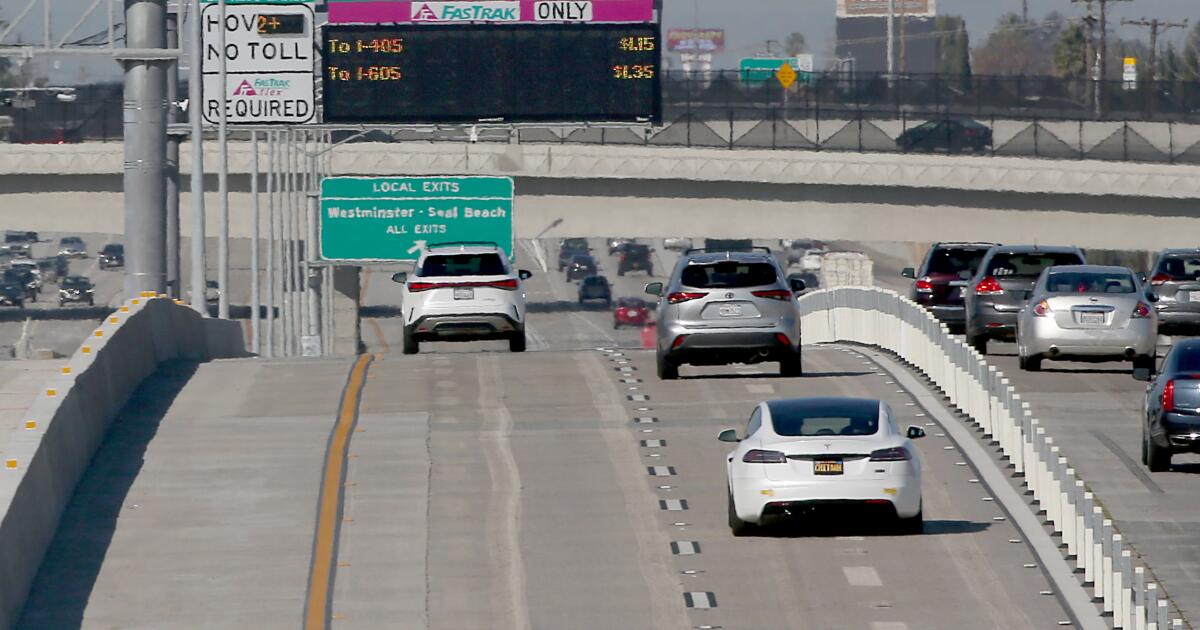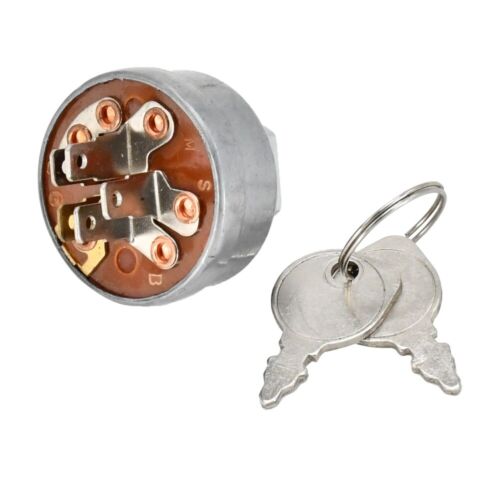Have you received a text message urging you to pay a FasTrak fee? It’s a scam. The message looks like this: “In order to avoid excessive late fees and potential legal action on statements, please pay the fee in time.” It also includes a link to a website. Instead of being a real notice to pay your bill, the message is a “smishing” scam. Smishing is a phishing attempt by text message aimed at stealing your personal or credit card information. “FasTrak, the electronic toll collection system used statewide in California, does not request payment by text with a link to a website,” California Attorney General Rob Bonta said in issuing a consumer alert about the problem in July. The FBI warned last April that the problem didn’t just impact California but was related to road toll services in at least three states. At the time, the FBI said its Internet Crime Complaint Center had received 2,000 complaints of smishing attempts since early March.The FBI’s smishing example included a fake message warning of a small outstanding toll amount with a much higher late fee if the target didn’t pay up. KCRA 3 has reached out to the FBI for an update on the number of recent complaints. John Goodwin, a spokesperson with the Metropolitan Transportation Commission and Bay Area Toll Authority, said he wasn’t sure if there has been an increase in FasTrak text scams lately, but that it “is clear that a lot of California mobile phone customers have received fraudulent text messages over the past several weeks.” He said that it’s been an ongoing problem since last February.“The problem has bedeviled mobile phone customers and toll agencies alike almost constantly during this time,” he said. “But the messages change frequently. Broadly speaking, the scamsters’ spelling and syntax has improved, but remain imperfect.”The website fastrak.org now includes a warning message to disregard phishing texts that detail a specific outstanding toll amount. What to do if you get one of these texts The FBI recommends that those who receive one of these texts file a complaint with the Internet Crime Complaint Center (IC3) and include the phone number where the text originated and the website that is listed with the text. You should then delete the text message. If you clicked any link or provided your information, the FBI recommends making efforts to secure your personal information and financial accounts. California’s attorney general says people can also file complaints with the Federal Trade Commission and his office. His office also recommends the following tips for avoiding toll scams. Don’t rush to click on links or respond to the texts.Check with your tolling agency if you’re worried the text is not legit. Only use a phone number or website that you know is real.You can also use your phone’s “report junk” feature.Once you’ve reported the scam, don’t engage with the sender and instead delete the message.See news happening? Send us your photos or videos if it’s safe to do so at kcra.com/upload.See more coverage of top California stories here | Download our app | Subscribe to our morning newsletter
SACRAMENTO, Calif. —
Have you received a text message urging you to pay a FasTrak fee? It’s a scam.
The message looks like this: “In order to avoid excessive late fees and potential legal action on statements, please pay the fee in time.” It also includes a link to a website.
Instead of being a real notice to pay your bill, the message is a “smishing” scam. Smishing is a phishing attempt by text message aimed at stealing your personal or credit card information.
“FasTrak, the electronic toll collection system used statewide in California, does not request payment by text with a link to a website,” California Attorney General Rob Bonta said in issuing a consumer alert about the problem in July.
The FBI warned last April that the problem didn’t just impact California but was related to road toll services in at least three states. At the time, the FBI said its Internet Crime Complaint Center had received 2,000 complaints of smishing attempts since early March.
The FBI’s smishing example included a fake message warning of a small outstanding toll amount with a much higher late fee if the target didn’t pay up.
KCRA 3 has reached out to the FBI for an update on the number of recent complaints.
John Goodwin, a spokesperson with the Metropolitan Transportation Commission and Bay Area Toll Authority, said he wasn’t sure if there has been an increase in FasTrak text scams lately, but that it “is clear that a lot of California mobile phone customers have received fraudulent text messages over the past several weeks.”
He said that it’s been an ongoing problem since last February.
“The problem has bedeviled mobile phone customers and toll agencies alike almost constantly during this time,” he said. “But the messages change frequently. Broadly speaking, the scamsters’ spelling and syntax has improved, but remain imperfect.”
The website fastrak.org now includes a warning message to disregard phishing texts that detail a specific outstanding toll amount.
What to do if you get one of these texts
The FBI recommends that those who receive one of these texts file a complaint with the Internet Crime Complaint Center (IC3) and include the phone number where the text originated and the website that is listed with the text. You should then delete the text message.
If you clicked any link or provided your information, the FBI recommends making efforts to secure your personal information and financial accounts.
California’s attorney general says people can also file complaints with the Federal Trade Commission and his office.
His office also recommends the following tips for avoiding toll scams.
- Don’t rush to click on links or respond to the texts.
- Check with your tolling agency if you’re worried the text is not legit. Only use a phone number or website that you know is real.
- You can also use your phone’s “report junk” feature.
- Once you’ve reported the scam, don’t engage with the sender and instead delete the message.
See news happening? Send us your photos or videos if it’s safe to do so at kcra.com/upload.
See more coverage of top California stories here | Download our app | Subscribe to our morning newsletter
With the rise of electronic toll collection systems like FasTrak in California, scammers are finding new ways to target unsuspecting victims. One recent scam that has been circulating involves fake text messages claiming to be from FasTrak.
Here’s what you need to know about the FasTrak text message scam:
1. The scam typically involves a text message claiming to be from FasTrak, informing the recipient that they have an outstanding toll violation that needs to be paid immediately. The message may include a link or phone number to contact in order to resolve the issue.
2. FasTrak does not typically send text messages about toll violations. If you receive a text message claiming to be from FasTrak, be cautious and do not click on any links or provide any personal information.
3. Do not provide any personal information, such as your social security number, credit card information, or driver’s license number, to anyone claiming to be from FasTrak over text message.
4. If you receive a suspicious text message claiming to be from FasTrak, you can contact FasTrak directly to verify the information. Their official website and customer service number can be found online.
5. Report any suspicious text messages to the Federal Trade Commission (FTC) or your local law enforcement agency. By reporting these scams, you can help prevent others from falling victim to fraudulent activity.
Remember to always be cautious when receiving unsolicited messages, especially when they involve payment or personal information. Stay informed and stay safe!
Tags:
FasTrak scam California, FasTrak text message scam, California scam alert, FasTrak fraud, FasTrak phishing scam, California cybersecurity, FasTrak scam warning
#FasTrak #text #message #scam #California










